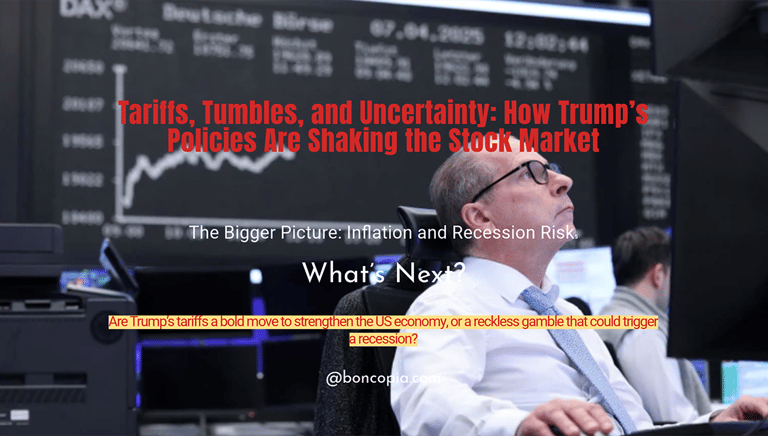Tariffs, Tumbles, and Uncertainty: How Trump’s Policies Are Shaking the Stock Market
4/19/20253 min read


Tariffs, Tumbles, and Uncertainty: How Trump’s Policies Are Shaking the Stock Market
Imagine waking up to a stock market in freefall, your portfolio flashing red, and headlines screaming about new tariffs. That’s been the reality for investors since President Trump’s aggressive tariff policies took center stage in late 2024. From Wall Street to Main Street, these policies are sending shockwaves through the economy, rattling markets, and leaving everyone wondering: what’s next? Buckle up as we dive into how Trump’s trade moves are reshaping the stock market—and what it means for you.
The Tariff Tempest Hits Wall Street
Trump’s tariffs—a 10% blanket on imports from most countries and a hefty 25% on goods from China, Canada, and Mexico—have turned global trade into a high-stakes poker game. The result? Pure market chaos. The S&P 500 plummeted 10.7% in just three days after a major tariff announcement, slipping into correction territory. The tech-heavy NASDAQ and small-cap Russell 2000 fared worse, diving into bear market territory with losses exceeding 20%.
Why the panic? Tariffs raise costs for companies reliant on imported goods, squeezing profits and sparking fears of higher consumer prices. Businesses can’t plan when the tariff timeline is murky, and the threat of retaliatory tariffs from trading partners like China looms large. As one X post put it, “Markets don’t mind bad news—they hate uncertainty. And Trump’s tariffs are uncertainty on steroids.”
A Brief Rally, Then Reality Bites
In late December 2024, a glimmer of hope emerged when Trump paused some tariffs, particularly on Canada and Mexico. Stocks surged, with the Dow jumping nearly 1,000 points in a single day. Investors exhaled, hoping the worst was over. But the euphoria was short-lived. The 10% global tariff remained, and China faced even steeper levies. By early 2025, markets slid back as reality set in: tariffs are here to stay, and their ripple effects are far from over.
Who’s Feeling the Heat?
No sector has been hit harder than technology. The NASDAQ, packed with chipmakers and electronics giants, tanked as fears of a US-China trade war intensified. Nvidia, the poster child of the AI boom, saw its shares crater after new US restrictions on chip exports to China. Retailers like Walmart and Target, dependent on cheap imports, are bracing for higher costs that could erode margins or force price hikes.
Meanwhile, small-cap stocks in the Russell 2000, often tied to domestic markets, are suffering as investors worry about a broader economic slowdown. As one financial analyst on X noted, “Tariffs are a tax on growth. Small businesses can’t absorb these costs like multinationals can.”
The Bigger Picture: Inflation and Recession Risks
Beyond the market’s daily swings, tariffs are stoking deeper fears. Economists warn that a 10% universal tariff could push US inflation up by 1-2%, forcing the Federal Reserve to rethink its rate-cutting plans. Higher inflation means tighter monetary policy, which could choke growth and tip the economy toward recession. Some analysts peg the odds of a 2025 recession at 20-30%.
Other government policies aren’t helping. Trump’s proposed tax cuts and spending plans could juice growth but balloon deficits, spooking bond markets. Regulatory shifts—deregulation in energy, new rules in tech—add another layer of volatility. It’s a perfect storm, and investors are caught in the crosswinds.
A Contrarian View: Are Tariffs Misunderstood?
Not everyone sees tariffs as the villain. Some argue they could bolster US manufacturing and reduce reliance on foreign goods, creating long-term gains. Historical data from the 2018-2019 trade war shows mixed results: while tariffs hurt consumers and sparked short-term market pain, they also pressured China to negotiate. The catch? Today’s tariffs are broader, and the global economy is shakier. Markets may be overreacting, but the uncertainty is real.
What’s Next for Investors?
Navigating this market feels like sailing through a hurricane. Diversifying portfolios, hedging with defensive stocks, or eyeing sectors like energy that benefit from deregulation could be smart moves. But with tariffs, Fed decisions, and global retaliation in play, staying nimble is key. As one X user quipped, “In this market, cash is king—until it isn’t.”
The stock market’s wild ride is far from over, and Trump’s policies are at the wheel. Whether you’re an investor, a business owner, or just watching from the sidelines, one thing’s clear: the stakes are high, and the future is anything but certain.
Thought-Provoking Questions:
Are Trump’s tariffs a bold move to strengthen the US economy, or a reckless gamble that could trigger a recession?
How should investors adjust their strategies to weather this tariff-driven volatility?
Could retaliatory tariffs from countries like China or the EU escalate this trade war, and what would that mean for global markets?
hello@boncopia.com
+13286036419
© 2025. All rights reserved.